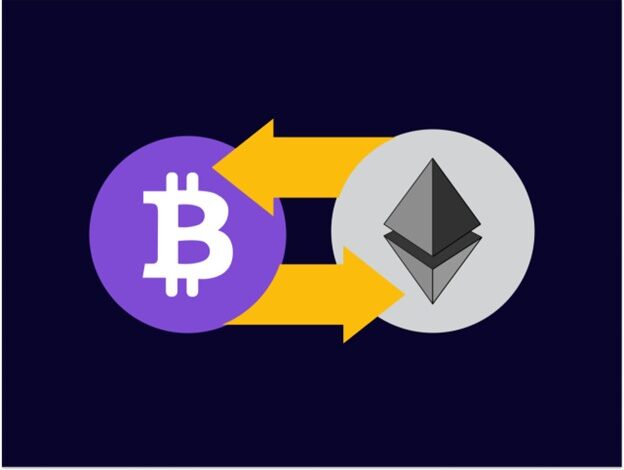Ethereum vs. Bitcoin: Key Differences Explained Simply

In the world of cryptocurrency, two names dominate every discussion: Bitcoin and Ethereum. These digital assets have not only led the charge in terms of market capitalization and adoption but have also shaped the way we understand blockchain technology today. Despite their shared foundation in blockchain, Bitcoin and Ethereum serve different purposes, operate under distinct frameworks, and appeal to different segments of the crypto ecosystem.
Whether you are a beginner looking to make sense of the crypto market or a trader seeking to optimize your portfolio, understanding the core differences between Bitcoin and Ethereum in 2025 is essential. This article breaks down these differences in a clear, structured, and factual way.
What Is Bitcoin?
Bitcoin, launched in 2009 by an anonymous figure known as Satoshi Nakamoto, was the first cryptocurrency to introduce a decentralized peer-to-peer system for transferring value without intermediaries.
Core Purpose
- Digital alternative to fiat currency
- Designed as a deflationary store of value
- Often compared to “digital gold”
Technical Framework
- Uses Proof of Work (PoW) consensus mechanism
- Fixed maximum supply of 21 million BTC
- Average block time: 10 minutes
Use Cases in 2025
- Inflation hedge in emerging economies
- Remittance tool across borders
- Long-term asset in digital portfolios, tradable globally on pairs like Bitcoin USDT, where deep liquidity and low fees make it one of the most active markets on MEXC.
What Is Ethereum?
Ethereum was created in 2015 by Vitalik Buterin and a team of developers to serve as more than just digital money. Its purpose was to build a decentralized application platform using smart contracts.
Core Purpose
- A decentralized world computer
- Platform for smart contracts and decentralized applications (dApps)
- Foundation for DeFi, NFTs, and tokenized assets
Technical Framework
- Transitioned to Proof of Stake (PoS) via “The Merge” in 2022
- No fixed supply cap; uses a burn mechanism (EIP-1559) to reduce inflation
- Average block time: 12–15 seconds
Use Cases in 2025
- Powering Web3 ecosystems, especially in finance, gaming, and identity
- Popular network for launching tokens and decentralized autonomous organizations (DAOs)
- Backbone of DeFi protocols worldwide — with the ETH USDT market on MEXC providing traders access to Ethereum’s expanding global liquidity.
Bitcoin vs. Ethereum: Side-by-Side Comparison
| Feature | Bitcoin (BTC) | Ethereum (ETH) |
| Launch Year | 2009 | 2015 |
| Creator | Satoshi Nakamoto | Vitalik Buterin and team |
| Consensus Mechanism | Proof of Work (PoW) | Proof of Stake (PoS) |
| Supply Cap | 21 million (fixed) | No cap; deflationary through burn mechanism |
| Average Block Time | ~10 minutes | ~12–15 seconds |
| Primary Use Case | Store of value, digital payments | dApps, smart contracts, DeFi, NFTs |
| Network Scalability | Limited, uses Lightning Network | Scaling via rollups, sharding, L2 solutions |
| Asset Type | Asset/currency | Utility token for operations and gas fees |
| Speed and Cost | Slower and cheaper | Faster but higher fees (varies by usage) |
Key Technical Differences Explained
Consensus Mechanisms
- Bitcoin relies on Proof of Work, which secures the network by requiring miners to solve complex algorithms. This process is energy-intensive but highly secure.
- Ethereum, post-Merge, uses Proof of Stake, allowing validators to secure the network based on token ownership. This results in reduced energy consumption and improved scalability.
Supply Models
- Bitcoin’s capped supply ensures scarcity, appealing to long-term holders and institutions.
- Ethereum’s model adjusts dynamically. With transaction fees being burned, ETH has experienced periods of net deflation, particularly during high network usage.
Smart Contract Functionality
- Bitcoin includes basic scripting capabilities for conditional transfers.
- Ethereum supports fully programmable smart contracts, enabling a wide range of applications from lending platforms to decentralized exchanges.
Real-World Adoption and Ecosystem Maturity (As of 2025)
Bitcoin Adoption Trends
- Legal payment method in several Latin American and African nations
- Integrated into treasury strategies of multiple multinational corporations
- Widely supported across centralized and decentralized exchanges
Ethereum Ecosystem Expansion
- Hosts thousands of tokens and projects, including stablecoins, DeFi apps, and NFTs
- Ethereum Layer 2 solutions like Optimism and Arbitrum handle over 70% of dApp traffic
- High developer activity, with robust funding through Ethereum Foundation and DAOs
Which Is Better: Bitcoin or Ethereum?
This question depends entirely on your goals:
Choose Bitcoin if:
- You want a store of value with a fixed supply
- You prefer simplicity and long-term holding
- You value decentralization and network security above all
Choose Ethereum if:
- You are interested in interacting with Web3 applications
- You value innovation, smart contracts, and programmable money
- You want exposure to DeFi, NFTs, or the broader token economy
Important Note: This article does not provide investment advice. Always conduct your own research and consider your risk tolerance before participating in any cryptocurrency market.
Trading Bitcoin and Ethereum on MEXC
MEXC supports seamless trading of both Bitcoin and Ethereum across spot and futures markets.
Why Use MEXC?
- Zero maker fees for BTC/ETH spot pairs
- Up to 500x leverage on selected futures
- Low slippage and deep liquidity for high-volume traders
- Global user base of over 36 million
You can also access hundreds of BTC and ETH derivatives, participate in trading competitions, and enjoy fee discounts using MEXC’s native MX token.
Ready to explore the world of Bitcoin and Ethereum with competitive fees and professional-grade tools? Start trading on MEXC today.
Frequently Asked Questions (FAQ)
What is the main difference between Bitcoin and Ethereum?
Bitcoin is primarily a store of value and a medium of exchange, while Ethereum is a platform for decentralized applications powered by smart contracts.
Can Ethereum replace Bitcoin?
No. Ethereum and Bitcoin serve different purposes. Bitcoin is optimized for value transfer and scarcity, while Ethereum focuses on programmable functionality.
Which is faster: Bitcoin or Ethereum?
Ethereum is faster, with block times around 12–15 seconds compared to Bitcoin’s 10-minute average.
Is Ethereum deflationary?
Since the EIP-1559 upgrade, Ethereum burns a portion of its transaction fees. During high network usage, ETH can experience net deflation.
Are Bitcoin and Ethereum safe to trade?
Both are considered secure and widely adopted. However, all cryptocurrency trading involves risks, including market volatility and potential loss. Always use a trusted exchange like MEXC and enable security features such as two-factor authentication.



